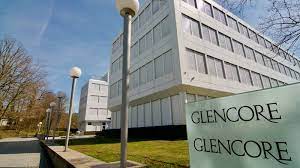Glencore bribes them using code words, according to US court papers
By Jeph Ajobaju, Chief Copy Editor
Glencore bribed senior Nigerian government officials with $52 million in 11 years between 2007 and 2018 and the global mining firm made $124 million profit from the deals, according to a court filing by the US Justice Department just disclosed.
Glencore is an Anglo-Swiss multinational commodity trading and mining company with headquarters in Baar, Switzerland. Its oil and gas head office is in London and its registered office is in Saint Helier, Jersey – a British crown dependency.
The current company was created through a merger of Glencore with Xstrata on 2 May 2013, according to Wikipedia.
Bloomberg reports that the United States Justice Department disclosed the bribes after Glencore agreed to pay $1.5 billion to settle probes in the US, the United Kingdom, and Brazil.
______________________________________________________________
Related articles:
Jersey to return to Nigeria £1.9m stolen by Jeremiah Useni
Jersey court seizes Nigeria’s £1.9m stolen by Jeremiah Useni
EFCC discovers 17 properties amassed by Idris
_________________________________________________________________
Using code words for bribe
Nairametrics, quoting Bloomberg, reports the court document as also disclosing that
- Glencore reached senior Nigerian government officials between 2007 and 2018 by words such as “newspapers” and “chocolates” as code words for bribes.
- “Employees at the Glencore UK units used coded language to conceal their discussion of bribe payments,” referring to them as “newspapers”, “journals” or “pages”.
- A Glencore trader told an agent in West Africa in an email in November 2018 that $90,000 was needed for newspaper reading material, the code for paying bribes to falsely undervalue fuel oil for the benefit of Glencore.
- “The newspapers will be delivered” personally, the agent replied.
- “Payments were sometimes concealed in large bundles of cash or through third-party companies, with deceptive invoices to Glencore for euphemistic costs or services such as “advance payment”, “marketing services” or “commission”.
- A Glencore executive in 2011 met with one of its West African intermediaries and a Nigerian government official in London to discuss a swap agreement that would allow Glencore to buy refined crude from Nigeria.
- The “Glencore’s representative, identified only as ‘Executive 1’, agreed to pay $14 million through the West African intermediary, knowing that some of those funds would be used as a bribe.”
- The sum was wired in March of 2011, the agent withdrew $1 million and gave it to the Abuja official as a bribe. When Glencore decided not to pursue the initiative, its intermediary sent back only $8 million out of the $14 million.
- Glencore units agreed to plead guilty to a list of charges that range from bribery and corruption in South America and Africa.
- Manhattan US Attorney Damian Williams said at a press conference:
“The tone from the top was clear: whatever it takes” citing $100 million in bribes to government officials in Brazil, Nigeria, the Democratic Republic of the Congo and Venezuela.
“The company will pay $1.5 billion to settle US, UK and Brazilian probes after admitting to bribery charges.”
Disclosures in other court papers
Another set of court papers in 2021 disclosed that
- Former Glencore trader Anthony Stimler pleaded guilty to a scheme to bribe Nigerian National Petroleum Company (NNPC) officials for an oil contract.
- He said he paid $300,000 in bribes to fund the election of a senior Nigerian government official.
- US prosecutors disclosed that millions of dollars were paid as bribes to NNPC and Nigerian government officials in exchange for more lucrative grades of oil on more favourable delivery terms contracts.
- Stimler worked on Glencore’s West Africa desk from around 2002 to 2009 and again from around 2011 to 2019.














